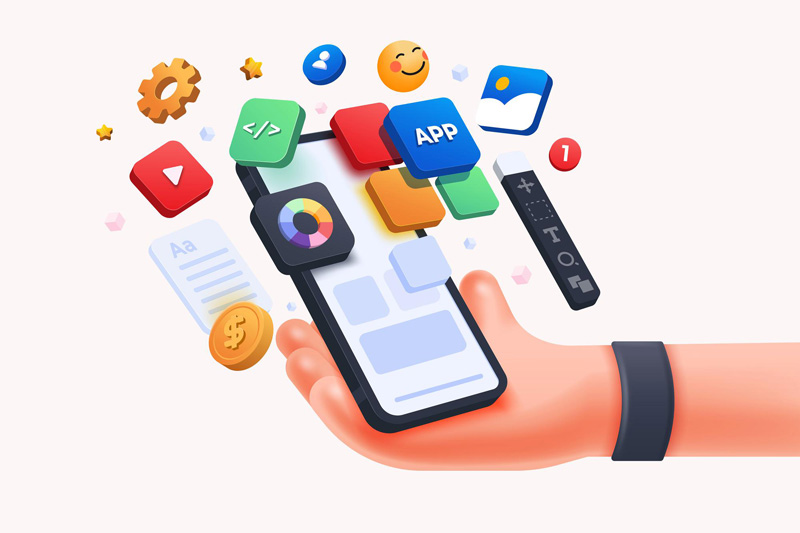An app development platform is a set of services and tools, such as tools for making and testing apps, services for running apps, cloud and data services, and operating systems. The platform gives guidelines for how apps should be built and run. Platforms may support native computer platforms like Android, iOS, Windows, and Linux or open-source, cross-platform development.
It covers software products for app development that provide developers and UX experts with time-saving techniques. This software makes apps for phones, the web, and computers. Some vendors sell their goods on all three platforms, while others only sell on one.
It is supported by Integrated Development Environments (IDEs), API frameworks, and testing products. It covers all stages of app development, including design, coding, integration, testing, and deployment.
Features of an App Development Platform
Depending on the product and service chosen, some of these features will be available on app development platforms.
- Integrated Development Environment, or IDE, is a graphical user interface that lets you edit, compile, and debug code.
- Support for both native and cross-platform.
- Support for more than one programming language.
- RAD (Rapid Application Development)
- Visual Coding Tools: Low-Code and No-Code Development.
- Mobile, Web, and Desktop App Development.
- Already made apps and templates.
- APIs are used to connect back-end systems and databases.
- Cloud Functions Support.
- Testing for compatibility with hardware and software.
- Tools and workspaces for working together, including mobile.
- Control of Access and Permissions.
- Source Control and Management of Deployments.
- Analytics and Reporting.
Platform Comparison for App Development
What kinds of apps do you build? Some vendors can help make apps for mobile, web, and desktop platforms, while others only work with one.
Where will the program be used? Some products only work on platforms they were made for, like iOS, Android, Windows, or Linux.
How hard is it to use your app? Complex apps will need custom code or the ability to change code that has already been generated. Choose your development platforms and tools accordingly. Low-code or no-code platforms should be enough if your app needs are more general. Choose a vendor with common apps and templates that fit your business’s needs.
Pricing Details
Prices for products and services related to an app development platform vary greatly depending on the features and scale needed. It can cost anywhere from $10 per user or app per month to $20,000 per year for enterprise installations and $12,000 per month for data centers. Large, complex installations usually require a price quote. There are often free trials, and training and help are sometimes included in the price.
Top platforms for developing mobile applications in 2022
Microsoft’s Xamarin
Many people like Xamarin because it is easy to use and works well on Android, iOS, and Windows devices. It also offers cross-platform mobile application development services, which means you can build a native app for more than one platform with just a C# code base. All these features will save you a lot of money and time when it comes to making them and getting them to market.
Flutter
Only a handful of the praises we may use to describe this Google open-source SDK are stylish and original. It is well-known for its flexibility when building user interfaces and how it can make unique, innovative, seamless animations, among other things. The most powerful apps are made on this platform using the Dart language. So, Flutter is a great way to make a 2D app game or a clothing store for iOS or Android.
Adobe PhoneGap
If you’re looking for different ways to build mobile apps that will fit your plans for growth in the future, you shouldn’t overlook PhoneGap’s open-source, free framework. With this option, you can use CSS, HTML5, and JavaScript to make a simple mobile app and improve its development by adding different libraries. With the plug-in architecture, the app can also be used in more ways, making it more useful for people who use cell phones.
Sencha
Sencha is on our list of the best platforms for making mobile apps, which is not a big surprise. It’s already very popular because it has a powerful data pack and a lot of user interface resources (over 115 components). It’s good for people who want a cross-platform app with a lot of data. The application is created using HTML5 code and can be downloaded and installed on several different operating systems, including Android, iOS, Blackberry, Windows, Kindle, and Tizen.
Appcelerator
The powerful and high-performance mobile app concept was successfully adapted for corporate consumers by Appcelerator. It is a development framework for the Titanium SDK that helps make it faster to make a mobile app for operating systems like iOS and Android. There is also more cloud storage, which can be integrated with third-party libraries to help businesses with global deployments in more than one region.
Ionic Framework
We love that Ionic is easy to use and works on multiple platforms. You can easily make it work on many different operating systems by using HTML, CSS, and Javascript. Also, if you want to make a more advanced eCommerce app for your phone with more useful features and more interaction, Ionic’s built-in AngularJS will meet your needs.
React Native
React Native may not be too different from the other mobile app development platforms listed above, but you won’t be sorry if you use it to make a mobile app. Facebook owns it. It is an open-source, cross-platform development platform that can work with other libraries. It can also cut down on time it takes to make apps for different platforms by having features that are easy to learn and make.




